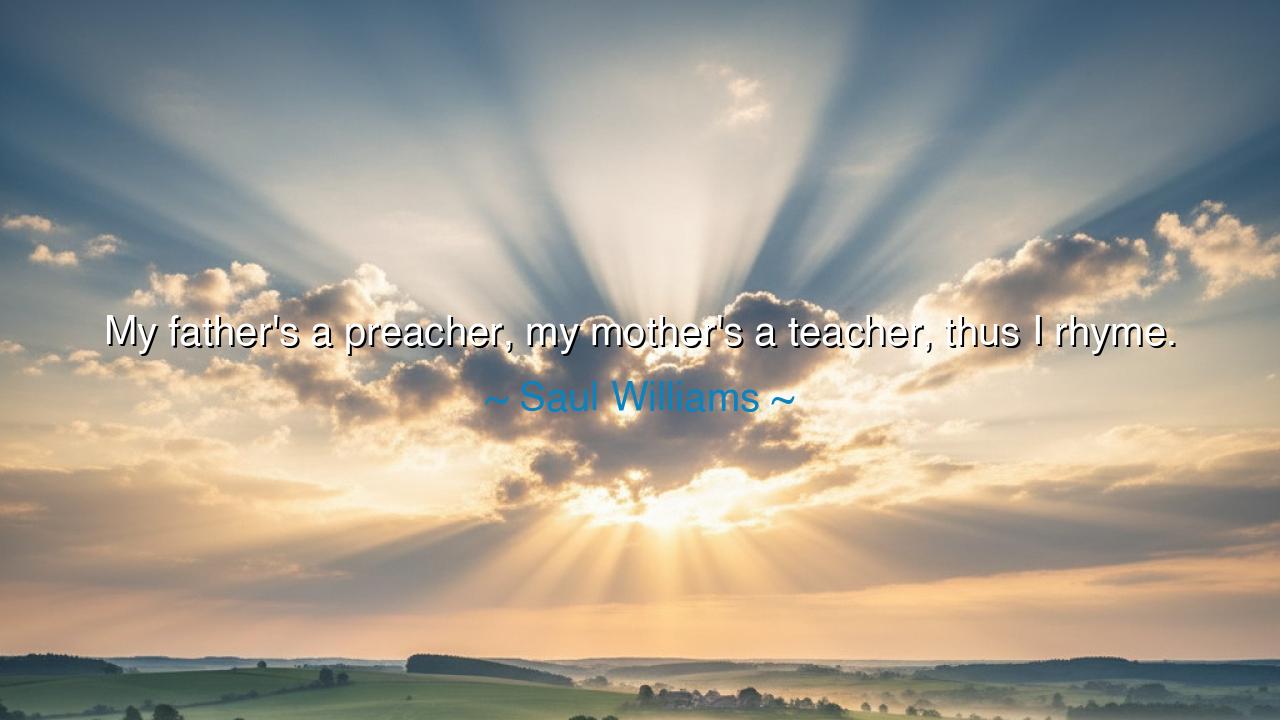
My father's a preacher, my mother's a teacher, thus I rhyme.






Saul Williams, the poet, musician, and prophet of rhythm, once declared: “My father’s a preacher, my mother’s a teacher, thus I rhyme.” In this short and powerful phrase, he traces the origin of his art to the two greatest forces of his upbringing—faith and knowledge, spirit and instruction, the sermon and the lesson. His rhyme is not random, nor born from vanity, but from the deep soil of heritage: the pulpit of his father and the classroom of his mother. He reveals that the roots of creativity lie not merely in talent, but in the convergence of lineage, culture, and the eternal voices that shaped his soul.
The origin of this thought rests in Williams’s own life, for he was raised in a house where words carried weight. His father, as a preacher, wielded language like fire—calling down heaven, lifting spirits, convicting souls. His mother, as a teacher, wielded language like light—guiding the mind, instructing the heart, passing on wisdom. From such a union comes the poet: one who burns with fire yet illuminates with light, one who moves the heart yet teaches the mind. His rhyme is the child of both worlds, and in declaring this, Williams pays homage to his inheritance while claiming his own voice.
History is rich with such examples, where greatness is born at the crossroads of faith and knowledge. Consider Martin Luther King Jr., the son of a preacher, who also inherited from teachers the discipline of learning. His words rang like sermons but instructed like lessons, blending passion with wisdom. Or think of Frederick Douglass, who, though born into slavery, was nurtured by scraps of education and the fiery tradition of abolitionist preaching. His speeches, like Williams’s rhymes, were forged from both the pulpit and the schoolhouse. In each case, we see the same pattern: when fire meets light, the result is voice, a voice that shakes the world.
The meaning of Williams’s words is deeply emotional and heroic. To say, “thus I rhyme” is to say: this is not accident, but destiny. It is to acknowledge that his art is the flowering of his parents’ gifts, that the sermon and the lesson live on in verse and rhythm. It is also a declaration that rhyme—the poetic form, the musical cadence—is itself both teaching and preaching. In the rhyme is the power to stir the soul, and in the rhyme is the power to awaken the mind. Through this marriage of influences, Williams places himself not only as artist but as heir of ancient traditions, a modern griot continuing the song of generations.
There is also a universal truth hidden here: we are all products of the voices that raised us. Some inherit the hammer and forge iron; some inherit the soil and cultivate gardens. Williams inherited the word, in its sacred and instructive forms. He reminds us that our lineage is not a prison but a seedbed, and that in honoring the voices of those who shaped us, we find the source of our own. His rhyme is not only personal but symbolic—it is the proof that when we unite spirit with knowledge, passion with wisdom, we create art that endures.
The lesson for us is clear: seek the union of fire and light in your own life. If you are taught knowledge, let it be guided by passion. If you are moved by passion, let it be disciplined by knowledge. Let your voice, whatever form it takes, become a continuation of those who came before you. Do not despise your heritage, for even its struggles may give you the rhythm of your art. Like Williams, trace your gifts back to their source, and then use them to create something new that serves both the heart and the mind.
Practically, this means cultivating both expression and wisdom. Read widely, study deeply, but also speak boldly, sing freely, and create passionately. If you come from silence, turn it into voice. If you come from pain, turn it into poetry. And if you come from heritage, honor it by building upon it. For as Saul Williams shows, when the preacher and the teacher meet in one soul, the rhyme is inevitable. It becomes the vessel through which truth and beauty flow, carrying forward the eternal work of awakening humanity.
Thus his words stand as both remembrance and command: “My father’s a preacher, my mother’s a teacher, thus I rhyme.” May we, too, look to the roots of our own lives and say: from these roots grows my voice, my art, my calling. And may we use that calling not for vanity, but for truth, for light, for fire—for the rhyme that echoes across generations.






AAdministratorAdministrator
Welcome, honored guests. Please leave a comment, we will respond soon